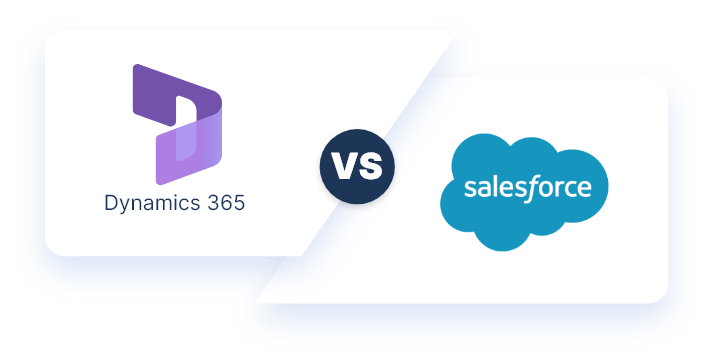Dynamics 365 CRM vs Salesforce:
A Head-to-Head Comparison
Managing customers and building a strong relationship with them has become a crucial factor in the growth of modern businesses. This factor has become so important that businesses have started adopting modern CRM solutions to streamline all activities involved in managing customers and offering utmost satisfaction to them.
Implementing a perfect CRM solution will empower businesses to streamline the entire sales journey, from becoming leads to converting into recurring customers. However, choosing the right CRM solution is a kind of hectic task, as we have a bunch of solutions available on the market.
When you start the search, you will find the Dynamics 365 vs Salesforce comparison in the top results because both solutions are market leaders. You can look for other solutions as well, but starting with the top market choices is always a better option.
All that Matters is a Perfect Choice
No doubt, Salesforce has been on the market for more than two decades, whereas Microsoft Dynamics 365 CRM is a new and advanced CRM solution that understands the fluctuating market demands.
When you look at the market share of Dynamics 365 CRM vs Salesforce, you will find that Salesforce dominates the market. However, this doesn’t mean it is a powerful solution and D365 CRM is an inferior one.
Modern Functionalities for Modern Businesses
Salesforce CRM has a good grip on the market, but Dynamics 365 CRM understands businesses better. With time, both solutions have launched different modules to manage the specific functionality of the business. Based on requirements, businesses can choose the module they require to manage customers. And, picking the desired module will reduce the implementation and operational costs.
In general, Salesforce comes with three major modules to manage the CRM functionality of the business:
- Salesforce Sales Cloud
- Salesforce Service Cloud
- Salesforce Marketing Cloud
These modules will manage the sales, customer, and marketing needs of the business.
When compared to Salesforce, Dynamics 365 CRM comes with more modules, which means it comes with advanced capabilities to manage a specific portion of the business. These modules are:
- Dynamics 365 for Sales
- Dynamics 365 for Customer Insights (formerly D365 for Marketing)
- Dynamics 365 for Customer Service
- Dynamics 365 for Field Service
Microsoft has recently updated Microsoft Dynamics 365 CRM to Microsoft Dynamics 365 Customer Engagement. It’s not just the name change; it’s a revolution towards modernization and digitalization of businesses.
Simplified Integrations to Power Up Customer Journey
Businesses are becoming more complex, and so are their processes. To reduce such complexities, businesses have to work with different add-ons and solutions altogether. Working with different tools and centralising the data is a daunting task and requires a lot of extra resources.
However, integrating the secondary solutions with the primary ones can automate a lot of processes and simplify the operations of not only CRM but the entire business. Salesforce allows integration, but you will need to put resources and effort into integrating a particular solution. For example, if you want to integrate Microsoft Outlook, you will need a developer or coder to establish the connection.
However, with Microsoft Dynamics 365 CRM, you can integrate Outlook with just a click and fetch the data for professional communication directly into the Dynamics 365 dashboard.
Microsoft has a plethora of business solutions available in the Dynamics 365 ecosystem. You can choose the desired solution and integrate it with other Microsoft solutions instantly.

Get the Perfect CRM for your Unique Business.
Fix a free one-on-one call and find the perfect CRM solution for your growing business.
Dynamics 365 CRM vs Salesforce: Quick Comparison
Get a quick comparison of Dynamics 365 vs Salesforce to understand the difference between features and core capabilities.
| Criteria | Dynamics 365 CRM | Salesforce CRM |
|---|---|---|
Criteria | Dynamics 365 CRM | Salesforce CRM |
| Deployment / Hosting | On Premise, Cloud, Hybrid | Only Cloud |
| Ease of Use | User friendly interface, easy to use for non- technical staff | Users' training is recommended |
| Monthly Cost per User | Ranging between £49 and £91.32, depending on the selected plan | Prices vary between £20 and £240, depending on the selected plan |
| Integrations | Tight integrations with existing Microsoft applications, like Outlook, Office, and Exchange | Limited integrations due to aggressive usage of proprietary coding language |
| File Storage | 10 GB shared storage for 1 to 20 users with 5 GB additional for each and up to 5 TB for 20 users | 1 GB data storage per user for 1 to 20 users and 11 GB additional shared storage |
| Architecture | C#, .NET, DHTML | Apex |
| Technical Support | Prompt service support | Service support included |
| Language | Supports 41 languages | Supports 18 languages |
| 99.9% Service Level Agreement (SLA) | Committed financial backed SLAs | Available on request and must be negotiated |
| Additional Applications or Modules | Project Service Automation (manages project based resource planning and automation); Field Service (manages on field workflows); Microsoft Social Engagement (manages social media engagements); Microsoft Relationship Sales (navigates sales leads with LinkedIn data). | Commerce Cloud Digital (ecommerce platform); Pardot (marketing automation service); Field Service Lightning (manages on field employees and workflows); Configure, Price, Quote or CPQ (tracks pricing) Data Management Platform or DMP (manages data); Community Cloud (portal builder) Einstein (Artificial Intelligence (AI) supported analytics service) |
| Order and Invoice Tracking | Available | Not Available |
| Complete Offline Solutions | Available | Not Available |
| Sales Driven User Experience | Available | Not Available |
| Native Outlook Experience (Online or Offline) | Available | Not Available |
| Sales Automation | Available | Available |
| Workflow/ API*/ SDK~ | Available | Available |
Pros and Cons - D365 CRM
Pros
- Flexible licencing model with competitive pricing, best for SMBs.
- Native and third-party integrations are available to enhance overall efficiency. You can easily integrate Office 365, Outlook, SharePoint, Power BI, and more.
- Comes with 99.9% uptime using a committed SLA.
- Interactive, simple, and intuitive interface to enhance the overall user-experience.
- Automate most of the marketing operations using Dynamics 365 Marketing.
- Collect and share customer data in real-time to offer a personalised experience.
Cons
- It is considered a new product, making customers unaware of its capabilities.
- Not all third-party applications can be available for integration. But you can do this with your Microsoft Dynamics 365 partner.
Pros and Cons - Salesforce CRM
Pros
- Popular as the industry's first cloud-based CRM application.
- Offer training and learning through different programmes organised by their homegrown education network, Trailhead.
- They offer the Salesforce AppExchange, an application marketplace that offers third-party integrations to help businesses enhance their capabilities.
- It offers enhanced e-commerce capabilities after the acquisition of Demandware.
Cons
- Only available in the cloud deployment option.
- It is way more expensive when compared to other popular CRM solutions.
- The user-interface is a bit more complex to understand and use.
- When it comes to personalisation, Salesforce CRM offers a kind of standard system with a few touch ups.
- You will have to face challenges while integrating Salesforce CRM with other business solutions.
To further compare the pros and cons of Dynamics 365 CRM vs Salesforce, you can book a call
with the team at Dynamics Square, a Microsoft certified CRM partner, and resolve all your queries.
Have you got
questions about Dynamics 365 vs Salesforce?
Click through to our FAQ for the best answers!
Let’s build the future of your business—together!
The right technology can change everything, and Dynamics Square ensures your business gets the tools it needs to succeed. Take the first step towards smarter solutions now!
